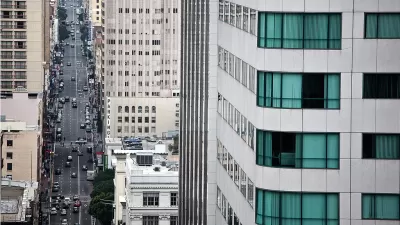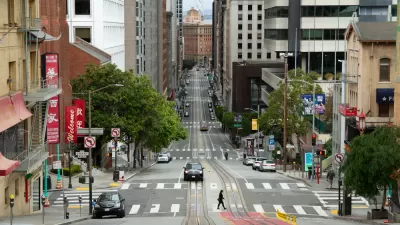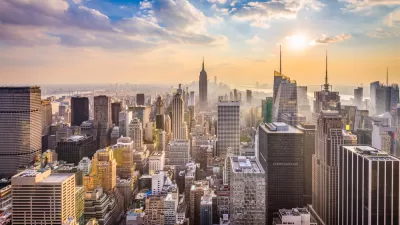Despite the purported exodus of untethered Silicon Valley workers from the Bay Area, rents in the city are still the highest in the United States.

San Francisco's famously high rents have dropped by close to 25% during the COVID-19 pandemic, writes Gabrielle Canon in the Guardian, but the city still remains the nation's most expensive, with the average one-bedroom renting for $2,660 per month.
According to the California Housing Partnership Corporation (CHPC), California needs roughly 1.3 million additional affordable rental units to meet the state's housing needs.
The pandemic complicated a pre-existing housing crisis in a region with California's highest rate of income inequality. While "tech workers and other high earners who easily adapted to work-from-home policies early in the pandemic while retaining big salaries have been able to lower their rental rates or cash in on new opportunities to purchase homes with extremely low interest rates," half of the area's renters lost income, writes Canon. The pandemic's uneven economic effects have hit low-wage workers in the hospitality and retail industries hardest, with few prospects of returning to the job market "any time soon," according to Karen Chapple, faculty director and professor of city and regional planning at the University of California, Berkeley. Int he article, Chapple warns that rent moratoriums, if not accompanied by permanent rent relief, are only a temporary solution for those who face eviction and homelessness.
FULL STORY: San Francisco rents are plummeting – but its housing crisis could get worse

Alabama: Trump Terminates Settlements for Black Communities Harmed By Raw Sewage
Trump deemed the landmark civil rights agreement “illegal DEI and environmental justice policy.”

Study: Maui’s Plan to Convert Vacation Rentals to Long-Term Housing Could Cause Nearly $1 Billion Economic Loss
The plan would reduce visitor accommodation by 25% resulting in 1,900 jobs lost.

Planetizen Federal Action Tracker
A weekly monitor of how Trump’s orders and actions are impacting planners and planning in America.

Waymo Gets Permission to Map SF’s Market Street
If allowed to operate on the traffic-restricted street, Waymo’s autonomous taxis would have a leg up over ride-hailing competitors — and counter the city’s efforts to grow bike and pedestrian on the thoroughfare.

Parklet Symposium Highlights the Success of Shared Spaces
Parklets got a boost during the Covid-19 pandemic, when the concept was translated to outdoor dining programs that offered restaurants a lifeline during the shutdown.

Federal Homelessness Agency Places Entire Staff on Leave
The U.S. Interagency Council on Homelessness is the only federal agency dedicated to preventing and ending homelessness.
Urban Design for Planners 1: Software Tools
This six-course series explores essential urban design concepts using open source software and equips planners with the tools they need to participate fully in the urban design process.
Planning for Universal Design
Learn the tools for implementing Universal Design in planning regulations.
Caltrans
Smith Gee Studio
Institute for Housing and Urban Development Studies (IHS)
City of Grandview
Harvard GSD Executive Education
Toledo-Lucas County Plan Commissions
Salt Lake City
NYU Wagner Graduate School of Public Service





























